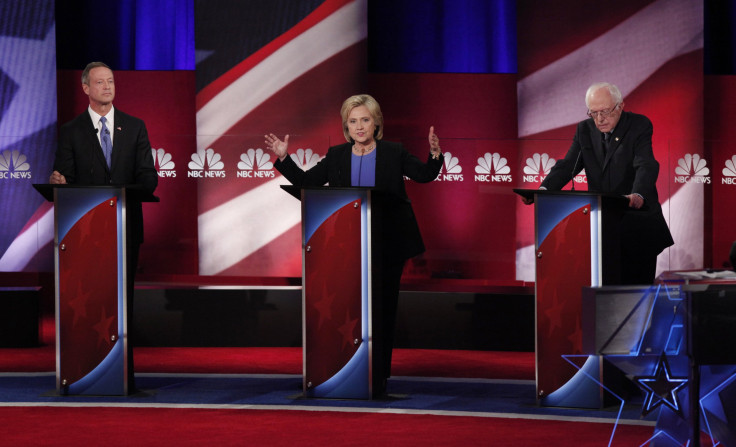Election 2016: Who Won Sunday's Democratic Debate? Clinton, Sanders And O'Malley Spar Over Healthcare, Guns And Wall Street

During the fourth Democratic debate Sunday in Charleston, South Carolina, the two leading candidates in the race, former Secretary of State Hillary Clinton and Vermont Sen. Bernie Sanders both put up strong performances, presenting the messages and personas that have drawn support to their campaigns. Touching on a range of issues like health care, gun control, criminal justice reform and reforming the Wall Street, the candidates illustrated some of their substantive differences. Sanders was an advocate for change and stuck largely to his criticism of Wall Street. Clinton presented herself as a pragmatist with real-life experience in political and foreign policy. The debate probably won't slow Sanders' momentum but it's unclear how much impact it will have just weeks before the Iowa caucus Feb. 1.
The event followed a week in which Clinton’s ability to clinch the party’s nomination was called into question by pundits and polls that seemed to show an ascendant Sanders -- one who could win both of Iowa and New Hampshire, the first two contests. That potential vulnerability for Clinton had raised the stakes for the candidates and Sanders found himself in Clinton’s cross-hairs.
Sanders tried to defend his gun control record -- which Clinton has been pounding lately as inconsistent -- saying that he has been a proponent of many gun control measures and hasn’t exactly been the National Rifle Association’s best friend.
“ I think Secretary Clinton knows that what she says is very disingenuous. I have a D-minus voting record from the NRA,” Sanders said before arguing that he has stood up several times to the gun lobby.
Clinton, meanwhile, did not relent and pointed to various times Sanders had voted against gun control measures while in public office.
Well, we've seen a #2016 presidential debate that wasn't about @realDonaldTrump.
— Debra J. Saunders (@debrajsaunders) January 18, 2016
I didn't think Clinton had a very good night, but didn't hurt herself. Sanders was very good at his schtick, but didn't expand it.
— David S. Bernstein (@dbernstein) January 18, 2016
She had other strong moments during the debate, too, especially in appealing to African-American voters. She spoke about reforming a criminal justice system that she called “racist.” African-Americans are an important demographic to win in South Carolina, the third primary on Feb. 20.
“One out of three African-American men may well end up going to prison. That's the statistic,” she said. “I want people here to think what we would be doing if it was one out of three white men, and very often, the black men are arrested, convicted and incarcerated.”
Sanders was at his most forceful in talking about his key issue, money in politics and a rigged financial system. He argued for his plans to reform Wall Street and break up big banks -- while painting Clinton as being cozy with the executives in those financial institutions. He repeatedly noted that Clinton has taken lots of money from the financial industry, both as campaign donations and in speaking fees. His demands for an overhaul of the financial industry may not have broadened his appeal to the older demographic where Clinton has strong support, but probably reinforced his appeal to younger voters who consider him a fresh voice, despite his 74 years.
This anecdote didn't seem to land that well w debate audience this time but seeing lots of journos commenting on it https://t.co/qSAw8F1Bop
— Abby Abrams (@abbyabrams) January 18, 2016
The two were joined on the stage by a third candidate, former Maryland Gov. Martin O’Malley, who was forced to repeatedly plead for extra time to talk from the moderators. He was competent and had a memorable moment when, while answering a question about American foreign policy, said that using the phrase “boots on the ground” is dehumanizing to soldiers.
One other major point of difference arose with health care reforms. Clinton has long argued for keeping Obamacare in place and tweaking it to expand its reach. Sanders, on the other hand, advocates a more complete overhaul. The candidates argued lengthily on what was politically viable and how expensive it would be to implement Sanders' proposal. In the discussion of health care -- as well as in defending herself against Sanders' criticism of her ties to Wall Street -- Clinton identified herself closely with the Obama administration. She may have decided that since Republicans are aready saying a Clinton presidency would be a third Obama term, she has nothing to gain from trying to put daylight between herself and the Democratic incumbent, and might as well try to energize his most loyal supporters.
With the Iowa caucuses just weeks away, Sunday’s debate was the final time the three candidates will share a stage on prime-time television before the first votes are cast. Iowa is followed quickly by New Hampshire on Feb. 9, and then South Carolina.
© Copyright IBTimes 2024. All rights reserved.






















